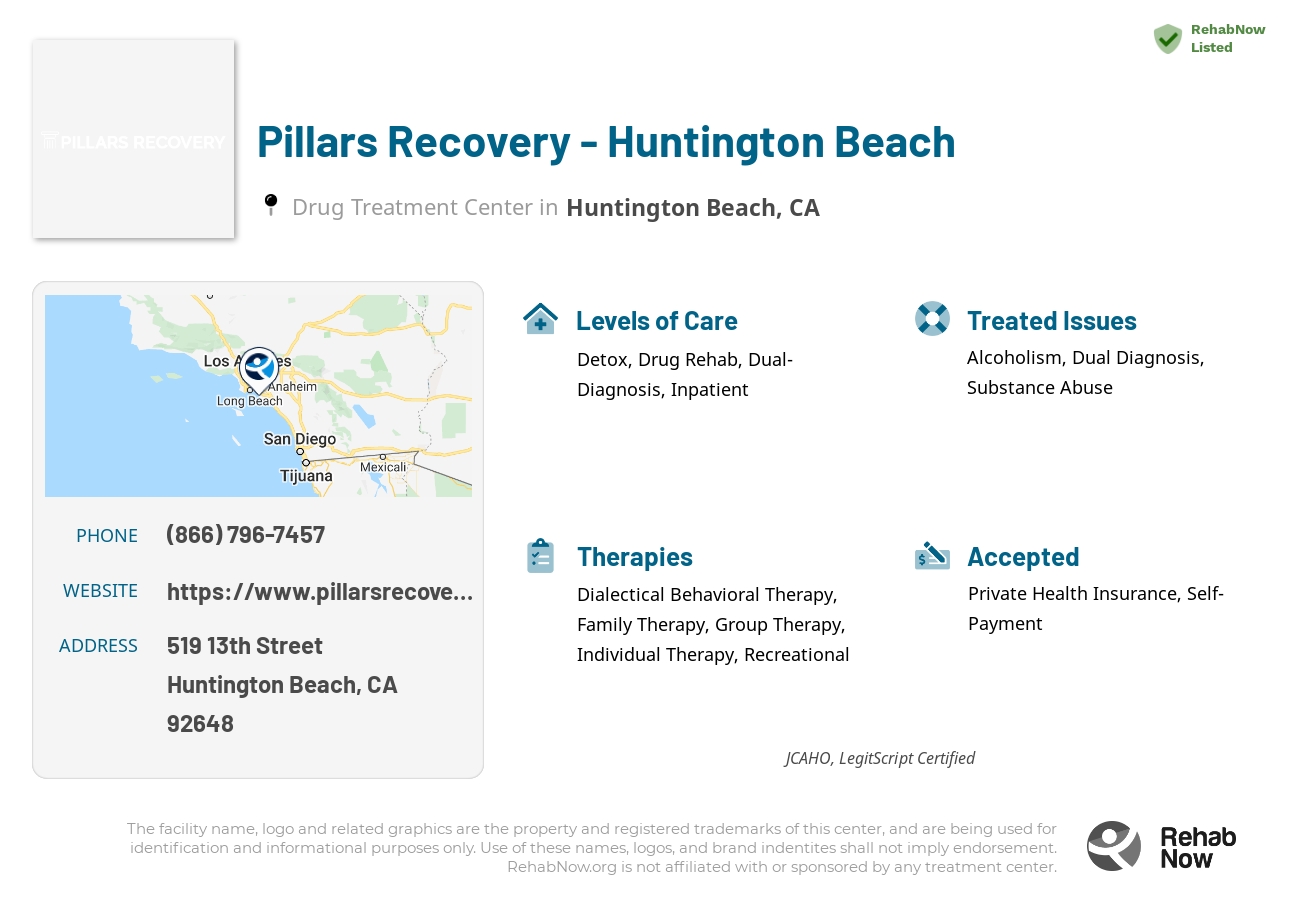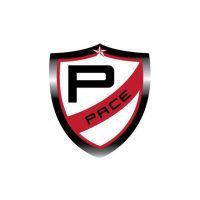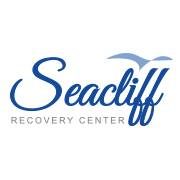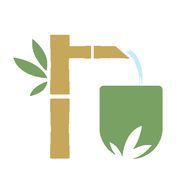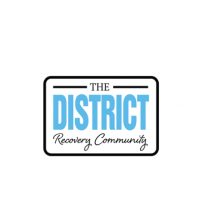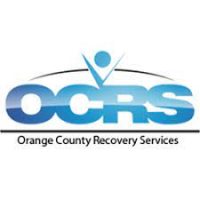Pillars Recovery - Huntington Beach
Drug Rehab Center in Huntington Beach, California
Pillars Recovery - Huntington Beach is an accredited addiction treatment center in Huntington Beach, CA that provides a range of personalized detox, inpatient and outpatient services, dual-diagnosis treatment and aftercare support with experienced professionals who understand the challenges of recovery and strive to create a safe and secure environment for healing, accepting many private health insurance plans as well as self-payment options.
About Pillars Recovery - Huntington Beach in California
Pillars Recovery - Huntington Beach is a reputable addiction treatment facility located in Huntington Beach, California. They have received accreditation from the Joint Commission on Accreditation of Healthcare Organizations (JCAHO), which ensures that their services meet high-quality standards. Additionally, Pillars Recovery - Huntington Beach is approved by LegitScript, a verification and monitoring service for online healthcare platforms. This facility specializes in providing comprehensive treatment for individuals struggling with alcoholism, substance abuse, dual diagnosis, drug addiction, and opioid addiction. Their services encompass a range of levels of care, including detox, inpatient treatment, outpatient programs, dual-diagnosis treatment, and aftercare support. They accept private health insurance, making their services accessible to a wider range of individuals in need.
Pillars Recovery - Huntington Beach offers a multitude of services to address addiction and substance abuse. They provide detoxification programs to help individuals safely and comfortably withdraw from drugs and alcohol. Their inpatient treatment program offers a structured and supportive environment for individuals to receive intensive therapy and counseling. Additionally, Pillars Recovery - Huntington Beach offers dual-diagnosis treatment, focusing on individuals with co-occurring mental health disorders and substance abuse issues. They also provide aftercare support to assist individuals in maintaining their recovery once they have completed their initial treatment. Through their outpatient programs, individuals can continue receiving therapy and support while living at home and attending to their daily responsibilities.
Genders
Ages
Modality
Additional
Accreditations

LegitScript

JCAHO
Conditions and Issues Treated
It’s not easy getting sober on one’s own, or even going to rehab and escaping the grasp of addiction by oneself. Substance abuse treatment gives addicts a place to stay sober while learning what it takes to quit for good. They will learn from others about what works and what doesn’t work with remaining drug-free.
Treatment centers such as Pillars Recovery - Huntington Beach focus on the needs of individual addicts to heal them. There is a combination of physical and mental therapies that treat the root cause of the addiction, whether it be family problems, stress, or past traumatic events.
The final benefit of substance abuse treatment is introducing new people who can help in your recovery after you leave Pillars Recovery - Huntington Beach. Through group therapy sessions with other addicts and attending support meetings once a day, a person will learn how to interact with others and cope with cravings. This is a chance for you to rebuild your social circle healthily after you leave treatment.
Opioid addiction starts when a person becomes addicted to legal or illegal opioids. The addiction can happen quickly, in just a matter of days. Opioid withdrawal can be extremely uncomfortable and lead the user to continue to use even if they want to quit. Stopping using an opioid requires medical observation. Sometimes inpatient treatment with a medically supervised detox is necessary for managing the withdrawal process while learning lasting tools for maintaining recovery. Medications may be used in some cases of opioid addiction.
Opioid addiction is one of California‘s most prominent forms of addiction. It’s treated by detoxifying the body so that the chemicals from the medications no longer impact them and by therapies to correct behavior and target the root of the problem.
Recovery is not simply about stopping drug use. Recovery is working with addiction while recovering mental health issues that are fueling the addiction in the first place.
Levels of Care Offered
This center offers a variety of custom treatment tailored to individual recovery. Currently available are Aftercare Support, Detox, Drug Rehab, Dual-Diagnosis, Inpatient, Outpatient, with additional therapies available as listed below.
Detox is the first step of rehab. It involves giving a person time to get the toxins out of their body. During detox, the patient gets ill and they will often start using again to get rid of these unpleasant feelings. That’s why it’s so important to have a Huntington Beach medical professional at Pillars Recovery - Huntington Beach present. A California medical professional will make sure patients don’t start using during detox. They will also provide medication to ease their symptoms and coach them through on a mental level.
Individuals who are suffering from severe addiction or have a high risk for dangerous health concerns are often recommended to receive inpatient treatment.
Choosing to enter an inpatient treatment program is beneficial for people who are suffering from severe addiction, or who have a high risk for dangerous health concerns.
Inpatient treatment is beneficial for:
- People who have a history of severe withdrawal.
- People who have attempted to overcome addiction on their own without success.
- People who have a history of relapse, or have recently relapsed.
- People at risk for drug overdose or withdrawal-related complications.
- People with medical conditions that are worsened by drug or alcohol use.
Outpatient treatment is considered the lower intensity level of addiction treatment. It’s ideal for early phase addiction or lower intensity addictions. It may include weekly sessions instead of daily. It may include weekly sessions instead of daily. Peer group support, 12-step programs, and individual counseling may still be involved but at a lesser frequency than an intensive outpatient program. It is a good choice for someone who doesn’t need to go through a medically supervised detox and who has a supportive home environment. It requires motivation and dedication to commit to the program without constant monitoring.
Aftercare support should take place after outpatient treatment has ended. There are a few different types of aftercare support that patients can seek. These include 12 Step, Self-help groups (AA, NA), Therapeutic communities, Long-term, structured sober living arrangements, and Halfway houses (residential treatment centers).
Therapies & Programs
Individual therapy involves one-on-one sessions between the patient and therapist. It provides patients with a safe environment to openly discuss personal and sensitive issues with the therapist. They find the therapist as someone they can trust. Individual therapy aims to identify the core issues that would have led the patient to substance abuse and address them effectively. The therapist can develop patient-specific customized solutions through individual therapy, which aids speedier recovery.
Couples therapy works with clients and significant others in a professional capacity to improve relationship dynamics. This can be helpful for addicts who are trying to marry the idea of recovery into their work, family, social lives – any aspect that has to do with relationships.
Through counseling sessions, addicts will have an opportunity to talk about their addiction with professional partners. These partners can offer feedback and advice on how to get sober while keeping healthy relationships intact. A good couples therapist will help addicts understand their part in an unhealthy relationship dynamic or find ways to deal with anger or resentment from significant others outside of the home.
Family therapy is a group problem-solving that aims to improve communication and relationships between the addict, their family, and sometimes friends. The main goal of family therapy for drug addiction is to create an environment where communication can occur without judgment, hostility, or blame. The therapist is with the family as they learn to communicate differently, especially with the addict when s/he is using. The family can learn to reduce their enabling behavior or rally together and support each other during tough times.
An addict’s family can play a vital part in helping them to avoid relapse because they can spot the warning signs and help them get back on track before it becomes too much of a problem. Family therapy is one of the most effective ways to help addicts stay on the path to long-term sobriety. When a drug addict decides that they want to try and get sober, it takes the support of every person they love to succeed. It can be incredibly difficult for loved ones to watch an addict go through the pain and suffering of withdrawal, but by being there with them and supporting them, they can help to make sure that the addiction never returns.
Groups typically involve meetings with other recovering addicts who can relate to one another’s experiences. They might meet in person or online and typically focus on the process of staying sober rather than overcoming a specific addiction.
In these groups managed by Pillars Recovery - Huntington Beach, addicts can build a sense of community and develop strong emotional connections with others who understand what they are going through. These beneficial relationships can help addicts overcome their cravings and prevent relapse at any point during the recovery process.
Dialectical Behavior Therapy (DBT) is a type of therapy created in the late 1980s and early 1990s to help people with high rates of suicidal behavior. DBT helps people learn how to live a life that is no longer controlled by overwhelming emotions and urges. It is beneficial in treating drug addiction because it helps patients understand and cope with their cravings for drugs or alcohol rather than turning to those substances as a way of coping.
There is hope for people who are addicted to drugs and alcohol. Cognitive Behavioral Therapy (CBT) is the solution. CBT focuses on the underlying thoughts and behaviors that caused the addiction problem in the first place and may cause a relapse. This type of psychotherapy addresses negative feelings common in substance abuse disorders. It helps to change them by restructuring thought patterns. It’s about removing negative thoughts and providing long-term benefits while promoting self-awareness, self-control, and healthy ways to respond to negative thoughts. These sessions can be done by themselves or as part of combination therapy.
Since addiction is a chronic physical and mental illness, addicts need to learn as many life skills as possible. Many drug treatment centers offer life skills activities as part of their addiction recovery programs. Examples include cooking classes, employment training, resume writing seminars, parenting classes, and computer training. Life skills activities help addicts find employment, take care of their families, and give back to the community.
The goal of medical nutrition therapy for drug and alcohol addiction is to help patients avoid “trigger” foods. For example, someone who craves alcohol may be addicted to sugar. Making sure this person eats a balanced diet with recommended amounts of protein, vegetables, and fruit can help manage urges to drink.
Nicotine replacement therapy treats nicotine addiction using external sources of nicotine, such as patches or gum to substitute for nicotine. This allows people trying to quit smoking to get their desired dose of nicotine without actually having to smoke cigarettes. The idea behind NRT is that by providing smokers with nicotine in forms that are not cigarettes, they may be more likely to quit smoking.
NRT has been available for many years now, and there is a wealth of evidence that shows that it helps people trying to quit smoking. There are several different types of NRT devices on the market now. Patients interested in quitting smoking should talk to their doctors about the best kind of NRT for them.
Patient Experience
Creative Arts
Creative Arts Therapy is a combination of several different types of art forms offered by Pillars Recovery - Huntington Beach. Music, painting/drawing, writing, and drama are just some examples. It can help with mental illness and addiction.
CAT is a form of art therapy at Pillars Recovery - Huntington Beach that uses creative activities such as music, painting, drama, and writing to help patients explore their feelings, develop social skills, and manage behavior. It is particularly effective with people who may not respond to other forms of therapy or lack the motivation to take part in more traditional forms of therapy. When combined with counseling, CATT can help people struggling with addiction or mental illness access their inner voices and discover their unique potential.
Experiential Therapy at Pillars Recovery - Huntington Beach
Experiential Therapy teaches people how to think differently about their lives and change their emotions by changing their behavior. This type of treatment is accomplished with various activities that may involve acting, props, arts and crafts, animal care, or other tools that may be effective.
This therapy aims for patients to release suppressed thoughts that cause bad feelings and drug addiction. Role-playing, arts and crafts, music, animal care, rock climbing, etc., are some of the activities used in this therapy. Gradually an individual will feel calmer and more loving which will change their perception positively. In addition to treating drug addiction, experiential therapy is beneficial for different behavioral and eating disorders.
Payment Options Accepted
For specific insurance or payment methods please contact us.
Is your insurance accepted?
Ask an expert, call (888) 674-0062
Pillars Recovery Associated Centers
Discover treatment facilities under the same provider.
- Pillars Recovery - Corona Del Mar in Corona Del Mar, CA
- Pillars Recovery - Men’s Treatment Center in Newport Beach, CA
- Pillars Recovery - Women's Treatment Center in Laguna Beach, CA
Learn More About Pillars Recovery Centers
Additional Details
Specifics, location, and helpful extra information.
Huntington Beach, California 92648 Phone Number(866) 796-7457 Meta DetailsUpdated November 25, 2023
Staff Verified
Is Pillars Recovery – Huntington Beach a LegitScript Verified Treatment Facility?
According to our most recent records, we have found this center to be LegitScript verified.
Pillars Recovery - Huntington Beach Patient Reviews
There are no reviews yet. Be the first one to write one.
Huntington Beach, California Addiction Information
More than 3 million of California's citizens are addicted to illegal drugs. Almost 800,000 people use hard drugs, almost 5 million use marijuana, and another 2.1 million abuse alcohol every year. Other substance abuse issues such as binge drinking and teen drug use are also common. Many illegal drugs such as cocaine, heroin, methamphetamine, and marijuana are smuggled into the state from Mexico.
Huntington Beach had the second-highest number of opioid overdose deaths from 2011 to 2015, with a total of 106 fatalities. It also has the highest DUI arrest and nighttime traffic accident rates. The most commonly used drugs in Huntington Beach are marijuana, cocaine, and opioids. The facilities in Huntington Beach offer expert assistance in managing withdrawal, detoxing safely, and working through the various stages of rehabilitation.
Treatment in Nearby Cities
- Lompoc, CA (155.7 mi.)
- Lake Forest, CA (18.4 mi.)
- Rancho Cucamonga, CA (38.5 mi.)
- Morgan Hill, CA (315.7 mi.)
- Scotts Valley, CA (325.4 mi.)
Centers near Pillars Recovery - Huntington Beach
The facility name, logo and brand are the property and registered trademarks of Pillars Recovery - Huntington Beach, and are being used for identification and informational purposes only. Use of these names, logos and brands shall not imply endorsement. RehabNow.org is not affiliated with or sponsored by Pillars Recovery - Huntington Beach.




